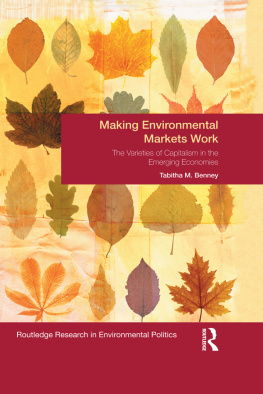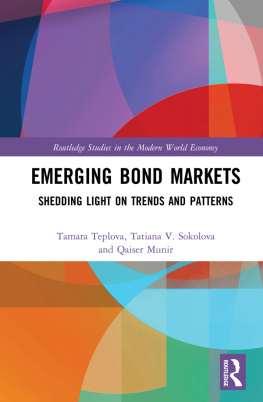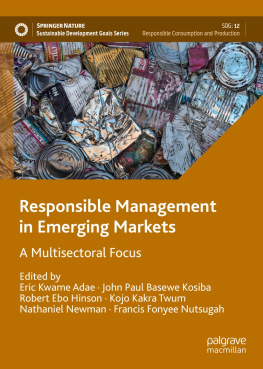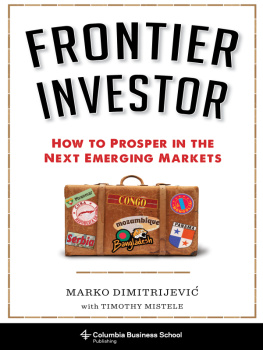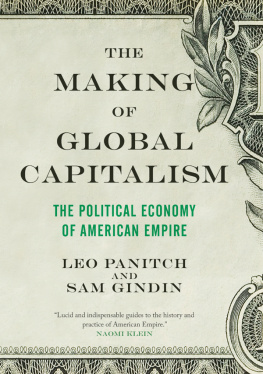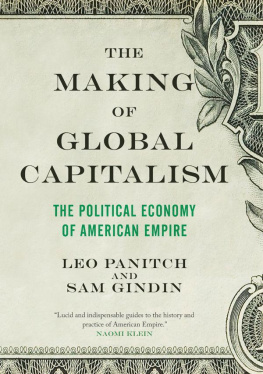Making Environmental Markets Work
Perhaps the most defining characteristic of the global economy today is the rise of emerging market economies (EMEs). Many of these states have experienced rapid economic growth over the past two decades that has led to an increasing share of global wealth. Such dramatic changes are highly relevant because they raise important issues about the distribution of global monetary and fiscal power. As the EMEs have gained importance in the global economy, their influence and significance have grown across a wide range of policy domains. One particularly relevant example is the increasingly critical role of EMEs in addressing climate change.
Contrary to the popular belief that the level of development determines a countrys ability to produce positive environmental outcomes, this book shows that the variation in environmental outcomes among the EMEs is due, in part, to differences in the types of economic institutions prevalent in their economies. Since EMEs differ dramatically on a number of factors, examining national variations in economic institutions helps explain why international climate policy has been more successful in some countries than in others. To assess how variations in capitalism may influence important outcomes, this book explores a representative sample of thirty-one EMEs and employs a mixed-method research design that incorporates both conventional regression analysis and Qualitative Comparative Analysis (QCA) to explain these outcomes. The analysis shows that although liberal market economies were expected to perform better than other types of capitalism, their performance fell below expectations. On the contrary, economic institutions related to coordinated types of capitalism (like those found in China and Brazil) have led to greater Clean Development Mechanism (CDM) market participation.
Theoretically informed, this book employs innovative ways of understanding a broad set of increasingly important, but understudied, states in an effort to highlight the interactions found in complex socio-political and ecological systems. With the growing importance of the EMEs, a better understanding of how to design market-based policies with them in mind will be required if future efforts across a range of policy issues are to be meaningful and effective.
Tabitha M. Benney is an Assistant Professor in the Department of Political Science and affiliated faculty at the Center on Global Change and Sustainability at the University of Utah. She received her PhD in Political Science from the University of California, Santa Barbara and her MA in International Affairs from Georgetown University. Previously she worked in the Policy and Global Affairs Division of the US National Academy of Sciences (NAS) from 20022007. Her research interests include International Relations, International Political Economy, Environmental Politics, Global Governance and Comparative Research Methods. Professor Benneys work has been published in Energy Policy, Wiley Interdisciplinary Reviews: Climate Change and the Review of International Political Economy. She has also received numerous grants and fellowships including the Louis G. Lancaster International Relations Fellowship from 20082011.
Environmental Politics/Routledge Research in Environmental Politics
Edited by Steve Vanderheiden, University of Colorado at Boulder.
For a full list of titles in this series, please visit www.routledge.com
Over recent years, environmental politics has moved from a peripheral interest to a central concern within the discipline of politics. This series aims to reinforce this trend through the publication of books that investigate the nature of contemporary environmental politics and show the centrality of environmental politics to the study of politics per se. The series understands politics in a broad sense, and the books will focus on mainstream issues such as the policy process and new social movements, as well as emerging areas such as cultural politics and political economy. Books in the series will analyze contemporary political practices with regards to the environment and/or explore possible future directions for the greening of contemporary politics. The series will be of interest not only to academics and students working in the environmental field, but will also demand to be read within the broader discipline.
The series consists of two strands:
Environmental Politics addresses the needs of students and teachers, and the titles will be published in paperback and hardback. Titles include:
Global Warming and Global Politics
Matthew Paterson
Politics and the Environment
James Connelly & GrahamSmith
International Relations Theory and Ecological Thought Towards Synthesis
Eric Laferrire & Peter Stoett
Planning Sustainability
Edited by Michael Kenny & James Meadowcroft
Deliberative Democracy and the Environment
Graham Smith
EU Enlargement and the Environment
Institutional change and environmental policy in Central and Eastern Europe
Edited by JoAnn Carmin and Stacy D. VanDeveer
The Crisis of Global Environmental Governance
Towards a new political economy of sustainability
Edited by Jacob Park, Ken Conca and Matthias Finger
Routledge Research in Environmental Politics presents innovative new research intended for high-level specialist readership. These titles are published in hardback only and include:
| 10. | The Environment and International Politics
International fisheries, Heidegger and social method
Hakan Seckinelgin
|
| 11. | Postmodern Climate Change
Leigh Glover
|
| 12. | Contemporary Environmental Politics
From margins to mainstream
Edited by Piers H.G. Stephens, with John Barry and Andrew Dobson
|
| 13. | Sustainable Consumption, Ecology and Fair Trade
Edited by Edwin Zacca
|
| 14. | Environmental Governance in China
Edited by Neil Carter and Arthur P. J. Mol
|
| 15. | Global Justice and Neoliberal Environmental Governance
Ethics, sustainable development and international cooperation
Chukwumerije Okereke
|
| 16. | The Politics of Unsustainability
Eco-politics in the post-ecologist era
Ingolfur Blhdorn and Ian Welsh
|
| 17. | International Organizations in Global Environmental Governance
Edited by Frank Biermann, Bernd Siebenhner and Anna Schreygg
|
| 18. | Regulation Theory and Sustainable Development
Business leaders and ecological modernisation
Corinne Gendron
|
| 19. | International Environmental Agreements
An introduction
Edited by Steinar Andresen, Elin Lerum Boasson and Geir Hnneland
|
| 20. | The Origins of Energy and Environmental Policy in Europe
The Beginnings of a European Environmental Conscience
Thomas C. Hoerber
|
| 21. | Governing Social Ecological Change
Long-term policies
Edited by Bernd Siebenhner, Marlen Arnold, Klaus Eisenack, and Klaus Jacob
|
| 22. | Reforming Law and Economy for a Sustainable Earth
Critical Thought for Turbulent Times
Paul Anderson
|
| 23. | Making Environmental Markets Work
The Varieties of Capitalism in the Emerging Economies
Tabitha M. Benney |

